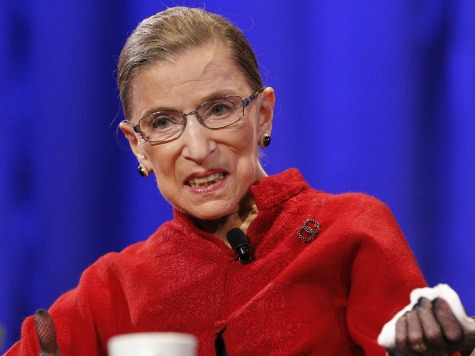
Three years ago, Supreme Court Justice Ruth Bader Ginsburg gave an interview which made some unintentional news when she discussed Roe v. Wade in terms of limiting “populations that we don’t want to have too many of.”
This Friday, the same interviewer had a second chance to ask Ginsburg what she meant, and the veteran judge somehow managed to avoid explaining the phrase at the center of the controversy.
In her interview with Ginsburg three years, ago Emily Bazelon published this exchange on abortion rights:
Q: Are you talking about the distances women have totravel because in parts of the country, abortion is essentiallyunavailable, because there are so few doctors and clinics that do theprocedure? And also, the lack of Medicaid for abortions for poor women?
JUSTICE GINSBURG: Yes, the ruling about thatsurprised me. [Harris v. McRae — in 1980 the court upheld the HydeAmendment, which forbids the use of Medicaid for abortions.] Frankly Ihad thought that at the time Roe was decided, there was concern aboutpopulation growth and particularly growth in populations that we don’twant to have too many of. So that Roe was going to be then set up forMedicaid funding for abortion. Which some people felt would riskcoercing women into having abortions when they didn’t really want them.But when the court decided McRae, the case came out the other way. Andthen I realized that my perception of it had been altogether wrong. [emphasis added]
This sounded a lot like a racial argument at the time. In her new interview, Bazelon attempts to clear up that misconception, saying, “To imagine that Justice Ginsburg would endorse eugenics as a motivationfor supporting legal abortion, you have to be out to get her.” Okay, then, it should be a fairly simple matter to clear up. So what did Ginsburg mean?
Justice Ginsburg also made it clear today that the issue she had in mindwhen we spoke in 2009 was concern about population growth among allclasses (and races). In the end, if that concern has a legacy, it’s inthe promotion of contraception.
This is a denial, not an explanation. If Ginsburg meant “all classes (and races)” why did she say “particularly growth in populations that we don’twant to have too many of”? These words clearly mean something other than everyone. They are singling out someone. The denial of the plain meaning of the words doesn’t make them go away. But incredibly, Bazelon never gets an answer to the question that is the focus of her piece.
It’s certainly possible Ginsburg was only describing the historical territory, not endorsing the views of population alarmists like Paul Ehrlich which were popular at the time. “Soylent Green,” a dystopian film about overpopulation, was released in 1973, the same year Roe was decided. If Ginsburg’s comments were meant to be descriptive and not prescriptive, why not just say that? For a moment, it seems this is where Ginsburg is going, but then she issues the flat denial that she meant anything at all, which undercuts all of that. It is an explanation more confusing than the original comment.

COMMENTS
Please let us know if you're having issues with commenting.